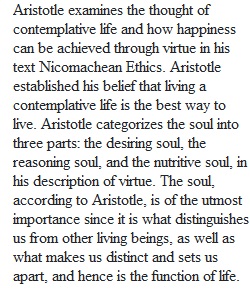


Q The last lesson of the fall term takes us to the summit of ancient wisdom: the study of 'Primary philosophy' with Aristotle. As we will see, this field of inquiry is as elevated as it is concrete. Indeed, for Aristotle, what really is is this desk over here, that tree over there. Aristotle's wisdom seems down to earth in contrast with Plato's, and yet... his First Mover hypothesis has mystical tones, too! Questions that get investigated this week include: • What are "substances" in the Aristotelian sense? • How does Aristotle innovate in comparison with the Presocratics and Plato? • How many types of "causes" do we need to explain the existence of things? • Do we need to postulate the existence of one very first cause to explain the world? In what sense is this cause a 'god'?
View Related Questions